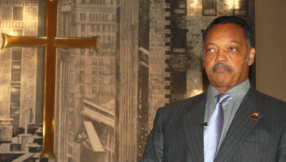It was the issue that swung the election for many of the 81 per cent of white evangelicals who voted for him.
Donald Trump's vow to pack the Supreme Court with conservative judges was crucial to his popularity with Christians who might otherwise be reluctant to support a man with such a dubious moral background.
Wayne Grudem, Franklin Graham, Eric Metaxas, Jerry Falwell and James Dobson all cited the court in justifying their support for Trump.
This is because the Supreme Court in America hangs in the balance. Out of nine seats, four are liberal leaning, four are conservative leaning and one is empty. The appointments are all lifetime positions. There is no limit to how long they can stay unless they are impeached, which last happened in 1805. Since 1970 the average tenure has been 26 years.
So it holds an immensely powerful position in the US legal system. But it is also highly political.
Supreme Court Justices are first nominated by the president but then have to be appointed by the Senate. Presidents suggest judges who are sympathetic towards their political leaning. Although the judiciary is supposed to be non-partisan, in reality it is nearly always neatly divided along party lines. It is difficult to find a judge in the US whose legal judgments aren't influenced by his or her political convictions.
In the current cohort John Roberts, Samuel Alito, Clarence Thomas and Anthony Kennedy lean consistently to the right, although Kennedy is slightly more unpredictable. Ruth Bader Ginsburg, Elena Kagan, Sonia Sotomayor and Stephen Breyer tend to be more liberal.
With upcoming battles over transgender bathrooms, restrictions to abortion provision and business' rights to refuse services to gay couples, it has never been more crucial for a politically minded conservative Christian.
On top of upcoming battles, Trump's nomination to the Supreme Court could secure his legacy for years to come.
With three judges 78 or older including 83-year-old liberal Ruth Bader Ginsburg, whom Trump called on to resign in July after she called him a "faker", Trump's administration could make further appointments to the one current vacant appointment.
Fellow liberal Stephen Breyer is 78, while conservative Anthony Kennedy is 80.
If these three retired or died in the next four years the Trump administration appointments could dominate the court for decades to come.
If further vacancies come up, the finely balanced 5-4 conservative lean of the Court could be tipped to a 6-3 bias. With a stronger mandate, conservative judges could then look to repeal landmark rulings on abortion such as Roe vs Wade.
Trump has already released a list of 21 judges as nominees and is thought to be sticking to that list.
Now he has promised to announce his choice next week for approval by the Senate.
Here are a few of his potential finalists.
William Pryor
Pryor, 54, is a protege of Trump's attorney general nominee, Jeff Sessions, and succeeded him as Alabama's state attorney.
A conservative firebrand, he famously labelled the Roe Vs Wade abortion ruling as "the worst abomination of constitutional law in our history".
The devout Roman Catholic is not universally loved by ultra-conservatives, however, despite being a fierce proponent of the death penalty and opponent of gay rights.
This is largely because he backed a ruling in 2011 that anti-transgender discrimination qualifies as sex discrimination and so was forbidden under the Equal Protection Clause of the US Constitution.
He also supported the suspension of Chief Justice Roy Moore for refusing to remove his monument to the Ten Commandments. Although Pryor supported Moore's right to have the display, after he refused a court order to take it down he backed Moore's suspension.
Neil Gorsuch
Gorsuch, 49, is another frontrunner and has earned a reputation as a scholarly conservative on the 10<sup>th Circuit Court of Appeals.
He is known for defending religious liberty in battles over Obamacare and is seen as a safer pair of hands than the lightning rod Pryor.
But he is more likely to confirmed by the Senate than his more outspoken rival.
"He is very bright, well-respected and quite personable," said John Malcolm, a lawyer at the Heritage Foundation, according to the LA Times. "And there's no question he would not be as contentious as some others.
Thomas Hardiman
Hardiman, 51, has a similar conservative record to other candidates with a particular focus on gun owners' rights.
He voted to strike down a New Jersey law that would have required people to show a "justifiable need" for a permit to carry a gun in public.
Like Gorsuch he would provide an easier choice to pass the Senate than Pryor and would match the voting record of the late Antonin Scalia, the former judge whose seat on the court is vacant.
The Pennsylvania judge was appointed by George W Bush in 2007 and, if nominated, would be the only Supreme Court justice law degree holder from an Ivy League university.













